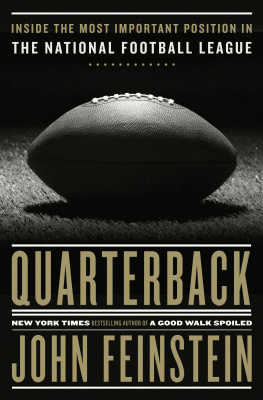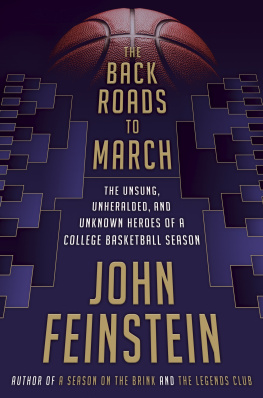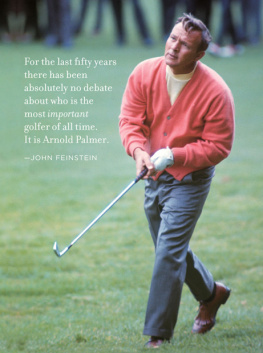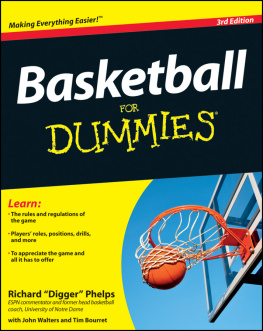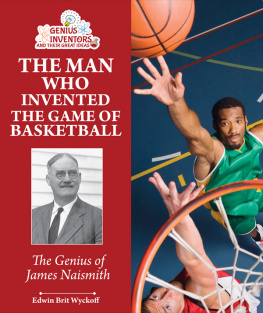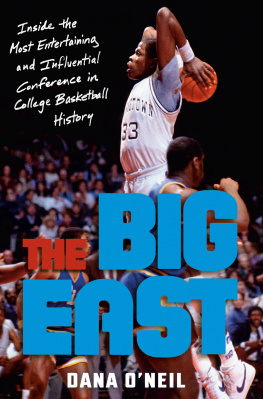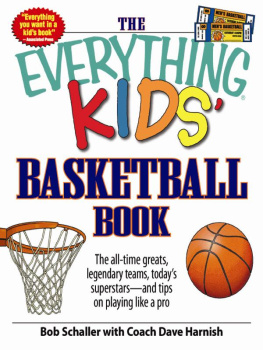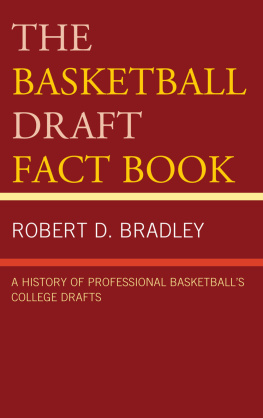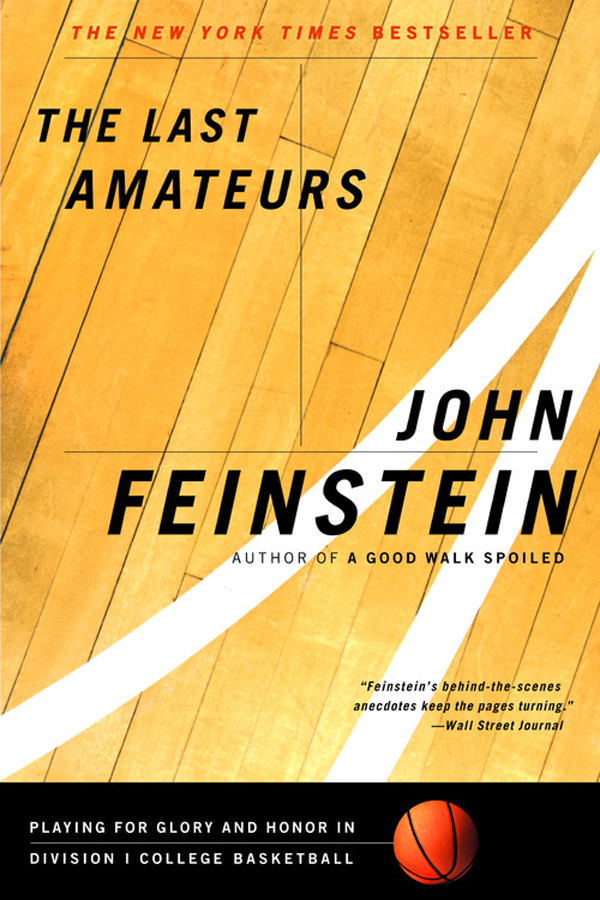In accordance with the U.S. Copyright Act of 1976, the scanning, uploading, and electronic sharing of any part of this book without the permission of the publisher constitute unlawful piracy and theft of the authors intellectual property. If you would like to use material from the book (other than for review purposes), prior written permission must be obtained by contacting the publisher at permissions@hbgusa.com. Thank you for your support of the authors rights.
Copyright 2000 by John Feinstein
Afterword Copyright 2001 by John Feinstein
All rights reserved. In accordance with the U.S. Copyright Act of 1976, the scanning, uploading, and electronic sharing of any part of this book without the permission of the publisher constitute unlawful piracy and theft of the authors intellectual property. If you would like to use material from the book (other than for review purposes), prior written permission must be obtained by contacting the publisher at permissions@hbgusa.com. Thank you for your support of the authors rights.
Little, Brown and Company
Hachette Book Group
237 Park Avenue, New York, NY 10017
www.hachettebookgroup.com
www.twitter.com/littlebrown
Second e-book edition: November 2001
The publisher is not responsible for websites (or their content) that are not owned by the publisher.
The Hachette Speakers Bureau provides a wide range of authors for speaking events. To find out more, go to www.hachettespeakersbureau.com or call (866) 376-6591.
ISBN 978-0-316-04922-1
John Feinstein has become sportswritings John Grisham.
Dave Kindred, Sporting News
One turns, with pleasure, to John Feinsteins The Last Amateurs. Feinstein probably doesnt know how to write a dull book. For one thing, his writing exhibits the easy kind of ebb and flow that makes a book a page-turner. Its almost amazing that Feinstein can juggle such a different, and often disparate, cast of characters and make them all so interesting. He is good at spotting the kind of detail that provides much more than face-value information. Its this kind of attention to detail that keeps The Last Amateurs humming along, from start to finish, like an important game between two closely matched teams with a long-established rivalry. As weve seen before, when it comes to match-ups, John Feinstein and basketball are a great one.
John Greenya, Washington Post
College basketballs fabled Patriot League makes fascinating fodder for Feinstein.
Teresa K. Weaver, Atlanta Journal-Constitution
Feinstein has written another winner. Throughout this book, youll get a glimpse of an often neglected side of college basketball and youll enjoy the view. There are plenty of good kids and good anecdotes, and Feinsteins typical thoroughness uncovers them.
Budd Bailey, BookPage
The great fun of this chronicle is in the wit and quirks of students who happen to love basketball and play it passably well: Spitler establishes mathematically at tone point that he may be the worst Division I player in the country, and hits upon the idea of using that distinction as a pickup line. Gems like that shine throughout The Last Amateurs.
Bill Littlefield, Boston Globe
Feinstein is a heck of a writer.
Phil Tatman, Orlando Sentinel
This is a look at American sports at its purest, written with the intensity, drama, and insight only Feinstein can provide.
Dermot McEvoy, Publishers Weekly
This book is for every sports fan whos tired of watching spoiled young millionaires jostle for the spotlight.
Vera H-C Chan and Sara Steffens, Times-Union
Its hard these days to find people willing to invest in losing seasons. But John Feinstein still believes in basketballs intangible joy, and is not afraid to make what some might think a corny case for integrity. For the jaded fan with dirty hands, The Last Amateurs might well amount to a long-overdue scrubbing. A throat-closing description of a Lafayette-Navy championship game appears in the books penultimate chapter.
Monica Wood, San Francisco Chronicle Book Review
Provocative. A portrait of the obscure side of Division I basketball. Mr. Feinsteins strength, as always, is his access, and there are numerous behind-the-scenes anecdotes that keep the pages turning.
Larry Platt, Wall Street Journal
An intensively reported book. Feinstein makes you care about the little-known players of the Patriot League. By the time two teams reach the conference finals with the leagues sole bid for the NCAA tournament on the line, youll be glued to the page and glad to learn that the road to the Final Four doesnt always have to be the March to Madness.
Bruce Fretts, Entertainment Weekly
The Majors
A March to Madness
A Civil War
A Good Walk Spoiled
Play Ball
Hard Courts
Forevers Team
A season Inside
A Season on the Brink
Running Mates
(A Mystery)
Winter Games
(A Mystery)
This is for
Ethan Samuel Sattler and
Matthew Richman Feinstein,
with love to their parents
TO PLAY THE GAME IS GREAT
TO WIN THE GAME IS GREATER
BUT TO LOVE THE GAME IS THE GREATEST OF ALL
Plaque in the lobby of the Philadelphia Palestra
Bucknell University, Lewisburg, Pennsylvania
Colgate University, Hamilton, New York
College of the Holy Cross, Worcester, Massachusetts
Lafayette College, Easton, Pennsylvania
Lehigh University, Bethlehem, Pennsylvania
U.S. Military Academy, West Point, New York
U.S. Naval Academy, Annapolis, Maryland
AS has often been the case in my career, this book took form when I wasnt looking for a book to write. And, as has been the case just as often, it took a while for me to figure out just how to go about doing it.
In March of 1995 my boss for life, George Solomon, asked me to cover an NCAA Tournament subregional in Dayton, Ohio, for the Washington Post. At the time, I didnt work for the Post, but that has never really mattered when it comes to my relationship with George. Ive always said we do our work best together when we arent working together.
I agreed to go. I have fond memories of Dayton, having covered a number of NCAA subregionals there through the years and because I first met longtime Dayton Coach Don Donoher and his wife, Sonia, as a kid in New York in 1968 when Dayton won the NIT. Even though Don had retired, I knew I would get a chance to see them.
George wanted me in Dayton for two reasons: he needed someone there who could write a column and he needed the University of Virginia covered. On the first day of the tournament, I did both: I wrote a column about Miami of Ohios upset of Arizona and then wrote a game story on Virginias victory over Nicholls State. It was about 6:30 by the time I finished the Virginia story. The evening doubleheader was scheduled to start in a little more than an hour. Since the first game was a virtual walkovertop-seeded Kansas against number sixteen Colgatemy plan was to go out and get a good dinner, then come back near the end of the first game (just in case someone from Kansas broke a leg and I had to write about it) and then stay for the second game between Michigan and Western Kentucky.
The arena was empty as I packed up my computer, the afternoon crowd having been cleared out, the evening crowd not having been allowed in yet. I had been writing on press row because Ive always enjoyed the feel of an empty arena, especially when the alternative is a smoke-filled press room. Walking toward the ramp that led to the parking lot, I spotted a familiar figure sitting all alone on one of the team benches.


